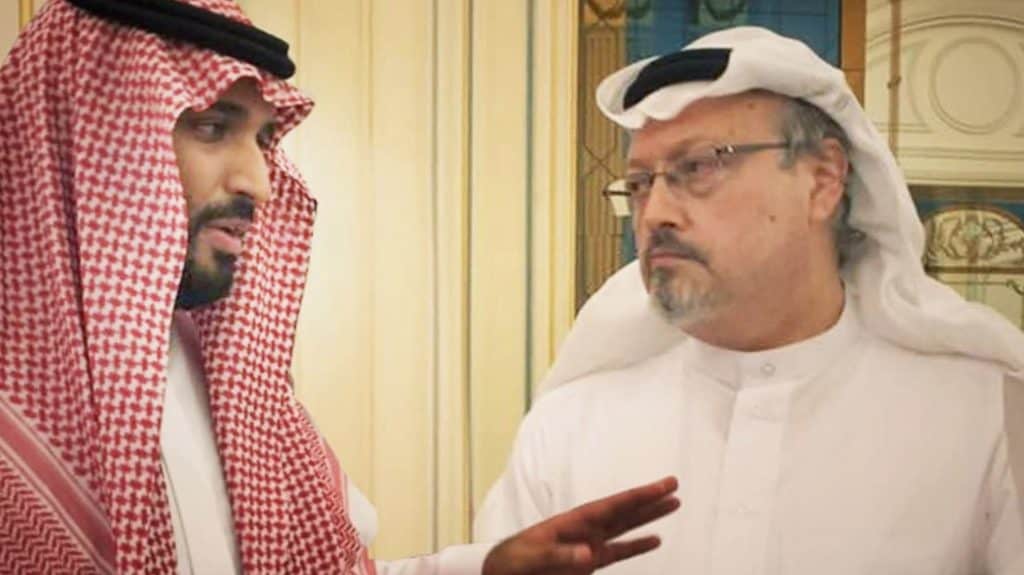The Moviegoer: The Dissident

How do you fight oppression the whole world ignores?
By Diana Beechener
Journalist Jamal Khashoggi walked into the Saudi Arabian consulate of Turkey 11 days before his 60th birthday in 2018. He was never seen alive again. His fiancé, who walked with him to the doors of the consulate, waited for 12 hours, begging for information. In the following weeks, the Saudis claimed Khashoggi left out a back entrance, died in a fist fight, had an asthma attack, and finally, that he was killed in what was deemed an “unknown incident.” His body was never recovered.
The government refused to cooperate with Turkish authorities who attempted to investigate. Eventually, a recording of the murder, which predominantly featured a bone saw, was released, giving the world a horrifying insight into just how Khashoggi suffered in his final moments. Those who cared about Khashoggi were left wondering what lead to such a provocative act of violence and if any world power would bother to hold the Saudi Arabian government accountable.
Frightening, disheartening, and tense, The Dissident is a documentary that will have you looking at your phone and social media with renewed skepticism. Academy Award-winning documentarian Bryan Fogel (Icarus) examines the last few months of Khashoggi’s life, trying to determine how he went from being considered an annoying reformist to a dangerous dissident who had to be killed. Using interviews with friends, intelligence officials, and fellow activists, Fogel pieces together the terrifying reach of the Saudi government and how its army of social media users wield control of what is seen and spread about them on Twitter.
The film explains how Saudi-crowned Prince Mohammed bin Salman has used progressive programs and technology to create a new government that appears reformed to outside powers but in reality, exacts even more control over its people. Fogel offers evidence that bin Salman has hacked the phones of important political figures, from Saudi dissidents to Amazon CEO Jeff Bezos. By embracing technology, the Saudi Arabian government has been able to extend its influence immensely.
Activist Omar Abdulaziz, whose close relationship to Khashoggi may have contributed to his state-ordered murder, is a victim of this online army. He spoke out against the country and gained enough Twitter followers to be considered a threat. He recounts the years of harassment, violence, and threats he and his family have faced due to his speaking out against the royal family. The only way that Khashoggi and Abdulaziz could safely speak against the state was to flee. Khashoggi became an outspoken critic of the state as a Washington Post writer, and Abdulaziz fled to Canada where he started a movement to counter the misinformation spread by his homeland.
Though Fogel blames the Saudi royal family and government for the murder of Khashoggi, he also examines the global climate that willingly ignored the murder. Weeks after the murder, America sold weapons to the country. The international community also didn’t offer any sort of sanction against Saudi Arabia for committing a murder in their consulate.
The Dissident also examines the importance of a free press. Fogel interviews several of Khashoggi’s colleagues, their frustration with being told what to write is palpable. Khashoggi’s editor at the Post, Fred Ryan, is shocked that Saudi Arabia would dare to kill a reporter yet Khashoggi’s colleagues don’t have the privilege of such innocence. They describe a world where writers must know the exact line they must not cross, or suffer the consequences.
A film about the dangers of muzzling those that speak truth to power, The Dissident is a brilliant documentary. It acts as a call to arms as well as a warning. We must protect our press and look at information with skepticism, lest we, too, are controlled by those with more money and power.
The Dissident is available for rent on any video-on-demand service.
Great Documentary * PG-13 * 119 mins.
